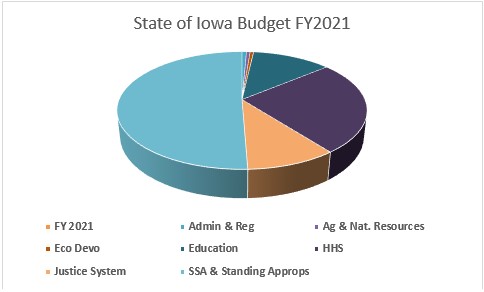This content was published prior to the combination of Dentons Davis Brown. Learn more about Dentons Davis Brown.
After an 11-week recess due to COVID-19 and a number of long days and late nights, the “second” session of the 88th General Assembly of Iowa adjourned sine die at 1:40 p.m. Sunday, June 14, 2020, almost two months after it was originally scheduled to adjourn (April 21, the 100th day).
This year’s historic and truncated session will not soon be forgotten, defined by both the COVID-19 pandemic as well the Black Lives Matter protests that were present for many of the final days of session.
Once the Governor’s 30-day veto period has expired (Tuesday, July 14) we will provide a comprehensive review of all legislation of interest from this session. Please find highlights from the 2020 legislative session below.
Budget
Budgeting for FY 2020 and FY 2021 became a difficult task due to the economic fallout of the coronavirus pandemic. The Revenue Estimating Committee (REC) had an emergency meeting in May to review and adjust the state’s revenue estimates based on the current situation and made downward adjustments to the revenue estimates.
The REC lowered both the FY 2020 General Fund revenue estimate $149.5 million and the FY 2021 General Fund revenue estimate $360.1 million from the March 2020 estimates.
Both the Governor and the legislature worked towards developing a mostly status quo budget, with few spending changes from FY 2020 to FY 2021, recommending that any reduction be applied to the estimated ending balance of the General Fund (estimated to be nearly $500 million).
The Governor’s recommendations and legislative actions account for the $100 million that was committed for K-12 education previous to this legislative session (as approved in SF2142 State School Aid and SF2164 Transportation Equity).
The legislature completed work on the budget in the early hours of Sunday morning. The agreed-upon budget appropriates nearly $7.778 billion ($26 million less than FY20). We have prepared an overview of the appropriations in this PDF.
The bill also sets broad budget guidelines and directs the Department of Management to determine the details of how most of the state and federal taxpayer dollars are spent (chart below shows total estimated federal COVD-19 relief funding for Iowa, estimated at $2.530 billion).

FY 2021 |
|
| Admin & Reg | $54,057,536 |
| Ag & Nat. Resources | $43,250,777 |
| Eco Devo | $41,595,830 |
| Education | $945,837,630 |
| HHS | $1,988,254,399 |
| Justice System | $768,576,150 |
| SSA & Standing Approps | $3,936,921,325 |
| General Fund Total | $7,778,493,647 |
Major Topics of the Iowa 2020 Legislative Session
Invest in Iowa Act
The Invest in Iowa Act was one of the initiatives Governor Reynolds touted in her Condition of the State Address and was designed both as tax reform and water quality funding. The Governor’s proposed bills (SSB 3116/HSB 657) were well positioned for an agreement to be reached between the chambers in 2020, prior to COVID-19. However, it became apparent during the COVID-19 crisis that extensive tax reform and water quality funding would not be possible due to the funding available for FY 20 and the uncertainty of funding in future fiscal years.
Future Ready Iowa—To Governor
A main priority of Governor Reynolds was to expand the Future Ready Iowa program to build a highly-skilled workforce and a K-12 curriculum focused on future workforce needs, expanding upon the Future Ready Iowa Act signed in 2018 which launched an aggressive workforce policy initiative to ensure that 70% of Iowans in the workforce achieve training or education beyond high school by the year 2025. The legislature was motivated to move on this priority as well – two versions of the bill (HF2629, SF2414) existed prior to the COVID-19 hiatus, both surviving the first funnel.
After the pause, in three quick days, the House and Senate found compromise in their bills and passed the House version which now goes to the Governor.
The Governor issued a statement on the passage of HF2629: “Iowa’s greatest opportunity for economic growth is to build a workforce that’s nimble and highly skilled,” said Gov. Reynolds. “Future Ready Iowa helps Iowans looking for a way up by connecting them to the skills and education needed for a life-long career. I appreciate the Iowa Legislature working with me to continue this program that has already changed the lives of so many Iowans.”
Professional Licensing Qualifications—To Governor
Another priority of Governor Reynolds was professional licensing reform. As with Future Ready, two versions of the bill existed prior to the COVID-19 hiatus, both surviving the first funnel. The bills are designed to attract and build Iowa’s workforce by removing barriers for out-of-state professionals to come in and practice specific professions. There are also provisions allowing a person with criminal convictions in certain circumstances to hold a professional license and fee reductions for applicants with household income under 200% of the FPL.
Policing Legislation—Signed by Governor (June 13)
On Thursday, June 11, the legislature approved the Plan for a More Perfect Union legislation (HF2647 and SF2416). Leadership introduced the bills on Thursday afternoon, and in a historic and unprecedented fashion, the bills were through committee and considered on the floor that evening with the Governor present. The bipartisan legislation:
- limits the use of chokeholds by police
- prohibits officers from being able to move to different agencies or from out-of-state if the officer has a record of misconduct
- requires annual training in de-escalation techniques to prevent bias in law enforcement
- requires the Attorney General to investigate deaths caused by officers
Leaders knew when they returned for 2020 2.0 that this was one of many issues that needed to be addressed and acknowledged that this bill is just a start. Governor Reynolds released the following statement on the passage of HF2647:
In Iowa, we know how to sit down at the table, listen to each other and work together to move forward. Over the past several days, leaders of the Iowa legislature came together with shared goals and a commitment for action. This was truly a bipartisan effort with all of us working side by side. I want to thank Representative Ako Abu-Samad, Representative Ras Smith, Majority Leader Jack Whitver, Minority Leader Janet Peterson, Speaker Pat Grassley, and Minority Leader Todd Pritchard for working together to bring meaningful change. These problems didn’t arise overnight, and they won’t be fixed in a day. We are just getting started, but our work together shows Iowa is willing to have the tough conversations and to look past our differences to find common ground and a brighter future for all Iowans.
Governor Reynolds the Plan for a More Perfect Union legislation on Friday, June 13, on the Capitol steps, stating this was the first step to systemic change.
Non-Economic Damages & Expenses (COVID-10 Immunity)—To Governor
Offering immunity to businesses was high on the priority list for the 2.0 2020 Legislative session. As reviewed last week, the House used an existing bill (SF2338) relating to medical malpractice to introduce a range of protections. Following the House’s passage of the bill late on Friday, June 5, the Senate took up and passed the bill on June 10. The bill is now with the Governor.
Withdrawing Life Support and 24-Hour Abortion Waiting Period (as amended)—To Governor
In the final 24-hours of session, the Senate revived a bill that provided restrictions on a court ordering the withdrawal of life-sustaining measures from a minor over the objection of a parent. The Senate sent the bill to the House on Saturday afternoon and in the middle of the night, the House approved an amendment adding a 24-hour waiting period before an abortion and passed the bill. The Senate concurred in the amendment around 5 a.m. on Sunday, the final day of the 2020 session. The bill is now with the Governor.
Medical Cannabidiol—To Governor
The Senate took up the House’s version of this bill, passing the more limited bill on Wednesday, sending it to the Governor. HF2589 gives health care providers the authority to write prescriptions for medical cannabidiol and increases the cap to 4.5 grams for a 90-day period. (Governor Reynolds vetoed HF732 last session because it struck the cap on THC levels and allowed patients to have 25 grams for a 90-day period.)
Discharge of a Sentence/HJR Felony Voting Amendment—Signed by Governor (June 4) but Constitutional amendment effort dies with HJR14
In 2019, Governor Reynolds called for the state to adopt a constitutional amendment to end its complete ban on felons regaining the right to vote and the House approved HJR14.
On Wednesday, the House sent SF2348 down to the Governor which she signed on Thursday, June 4 stating, “This legislation allows us to implement our proposed constitutional amendment restoring the voting rights of Iowans who have completed serving their sentence. The right to vote is the cornerstone of being a part of any society, and I am proud of the broad coalition supporting this amendment.”
SF2348, in conjunction with HJR14 (if signed by the Governor and ratified by the electors), would authorize the automatic restoration of a felon’s voting rights, only after:
- completion of confinement/parole/probation/special sentence
- receipt of a pardon
- payment of all pecuniary damages
Senate Republicans held action on HJR14 until the passage of SF2348 by the House.
The Senate Judiciary Committee passed HJR14 on Friday, June 5, but the full Senate did not take up the resolution. The failure to do so means that the proposed amendment will need to start again with the 89th General Assembly, and then be approved by the 90th General Assembly. Provisions of SF2348 are automatically repealed at the end of 2022 with the passage of the resolution.
Des Moines Black Lives Matter, the ACLU, and the NAACP have called upon Governor Reynolds to immediately sign an executive order to restore the voting rights of every Iowan who has been convicted of a felony and that restitution not be required to be paid in order to vote.
Weapons Omnibus—To Governor
HF2502, relating to local municipality limitations on weapons and ammunition, was approved by the Senate and sent to the Governor on Wednesday, June 3.
Voter ID and Iowa Election Law Changes (as amended)—To Governor
This bill garnered an immense amount of attention after the Senate Government Committee approved HF2486, amending the bill to include a number of election law changes on Friday, June 5. The Chair of the State Government Committee indicates that these new provisions are necessary to make voting more secure. Democrats believe the amendment will result in voter suppression.
The state had record turnout from both parties for the 2020 primary due to the actions of Secretary of State Paul Pate mailing out absentee requests to registered voters. Leadership indicated they will review elections procedures to provide clarity for the November election. The Senate passed the bill as amended on Wednesday, June 10 (30-19), returning the bill to the House.
Via a bipartisan amendment, the House rejected most of the amendments the Senate added to HF2486. The House retained provisions on faithless electors and limiting the number of polling places that can be closed due to an emergency. The House amendment also requires the Secretary of State to get approval from the Legislative Council for emergency election changes. The House passed the amended version of HF2486 (95-2) and returned the bill to the Senate.
The Senate accepted the House changes to HF2486. However, the Senate added additional restrictions related to county auditors and voter ID in their final amendment (S-5163 to HF2643) to the FY 2021 Appropriations Omnibus bill, which was passed in both chambers to finalize the FY 2021 budget and is now with the Governor.
Tax Changes—To Governor
In the final two weeks of session, both chambers worked on separate tax bills. On the last day of session, legislators reached an agreement on the tax changes, which have an estimated fiscal impact of reducing General Fund revenues by $41.9 million in FY 2021.
An overview of the changes agreed upon and passed by both chambers is here, including updates on administration, sales tax, income tax, school tuition organization, research credit, partnerships/passthroughs, setoff procedures, business interest, global intangible low-taxed income, reinvestment districts, computer peripherals, broadband grants, assessors, out-of-state credits, bonus depreciation, married taxpayers, 529 plans, homebuyers, short-term rentals, Lake Improvement Zones and COVID-19 related issues. This bill is now with the Governor.
Other Notable Events of the 2020 Legislative Session
- Iowa Caucuses reporting deficiencies, jeopardizing Iowa’s First in the Nation caucus status.
- Rep. Mark Smith was elected as the new chair of the Iowa Democratic Party after Troy Price stepped down. Rep. Smith, the former Iowa House Minority Leader, served his last session in the statehouse.
- Iowa Supreme Court selected Justice Susan Christensen as the new Chief Justice, replacing the late Justice Mark Cady. Governor Reynolds appointed Christensen to the Supreme Court in 2018.
- Senate President Charles Schneider announced his retirement, leaving Senate District 22 an open seat in the 2020 election.
- Iowa Legislature pauses the 2020 session on Monday, March 16 until June 3.
- Over a dozen State of Public Health Disaster Emergency Declarations issued by Governor Reynolds, first restricting gatherings and requiring business closures, then reopening the State of Iowa completely by June 12, which happened to coincide with sine die.
Closing Remarks
The governor and legislators had these final remarks today as the 2020 legislative session adjourned.
Office of the Governor
- Kim Reynolds/Lt. Gov. Adam Gregg
House
- House Minority Leader Todd Prichard (D-Charles City)
Senate
- Senate President Charles Schneider (R-West Des Moines)
- Majority Leader Jack Whitver (R-Ankeny)
- Senate Minority Leader Janet Petersen (D-Des Moines)


